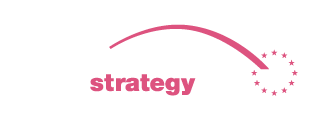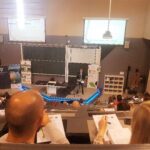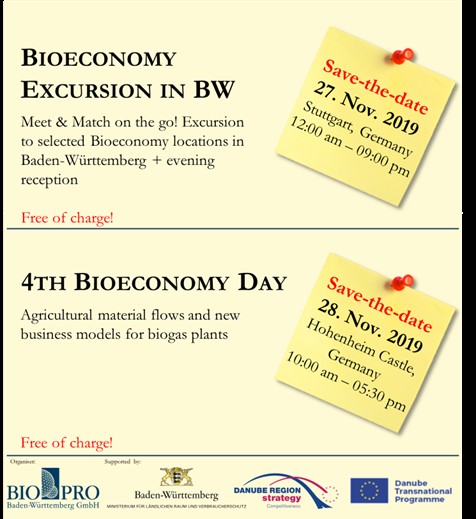We are glad to invite you to Baden-Württemberg and get a chance to meet and match with experts from science, industry and politics to jointly discover cooperation opportunities.
Two events under the motto “Transnational Bioeconomy Partnerships: Meet & Match on the go!” will take place in Stuttgart, Germany, on the 27-28th of November 2019 and are organized in cooperation with the Ministry of Rural Affairs and Consumer Protection and the Ministry of Economic Affairs, Labour and Housing of Baden-Württemberg, which is responsible for the coordination of the Priority Area 8 of the EUSDR.
On 27.11.2019, you will have the chance to visit two selected bioeconomy locations in Baden-Württemberg. After welcoming words at the Ministry of Economic Affairs, Labour and Housing Baden-Württemberg, we are heading to the Agricultural Experiment Station of the University of Hohenheim, Unterer Lindenhof, followed by a visit of the German Institutes for Textile and Fibre Research Denkendorf (DITF). In the evening, you are cordially invited to a reception with the State Secretary of the Ministry of Rural Affairs and Consumer Protection Friedlinde Gurr-Hirsch and the State Secretary of the Ministry of Economic Affairs, Labour and Housing Katrin Schütz.
On 28.11.2019, one of the most important annual bioeconomy events in Baden-Württemberg, the 4th Bioeconomy Day, will take place at the Hohenheim Castle. This year the focus lies on material flows from agriculture and diversification options for biogas plants. We will also take a closer look at agricultural innovations in Europe, especially biorefineries.
The participation at both days is free of charge. The excursion day (27.11) will be conducted in English. The 4th Bioeconomy Day (28.11) is in German with simultaneous translation in English (plus, one of the workshops will be conducted in English).
Detailed information about both events can be found under the link below. For organizational reasons online registration is required. Please register until 21.11.2019 via https://www.bio-pro.de/en/events/transnational-bioeconomy-partnerships-meet-match-go-excursion-evening-reception
Background
Bioeconomy is one of the major European policy priorities to support sustainable development. Since Bioeconomy is especially appealing to both governments and industries for its adaptability to local needs, many countries and regions have started to develop own Bioeconomy strategies. These regional strategies are needed to pool regional excellence and resources for a tailor-made strategic approach achieving implementation agendas. With this regard, Baden-Württemberg adopted its regional strategy “Sustainable Bioeconomy Baden-Württemberg” in June 2019.
Yet, the development of a desirable and sustainable future requires regional actions coupled with global thinking. Knowledge exchange, joint technological development, global services, convertible local bioeconomy concepts for global use, special raw materials that can be produced only in certain locations – these are only several examples for the need of transnational cooperation to accompany regional activities.





